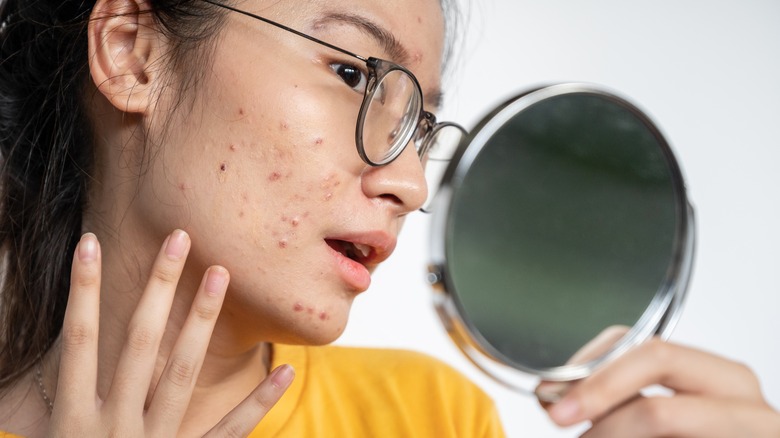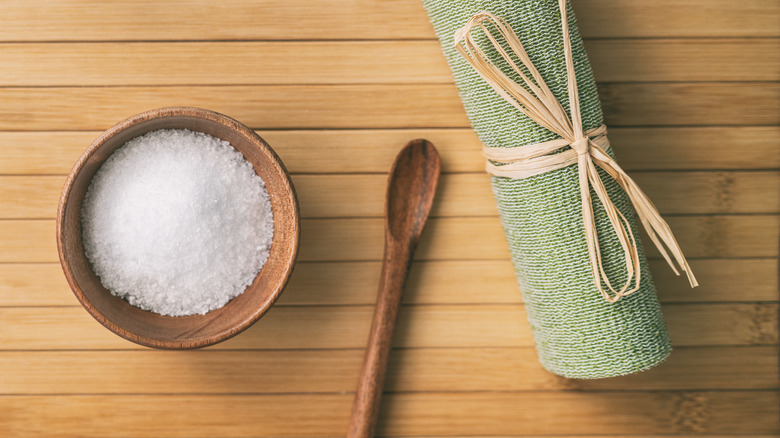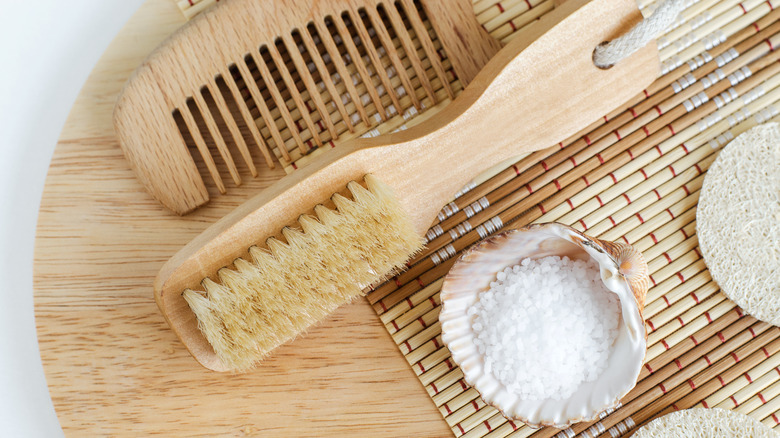Can You Use Epsom Salt To Treat Acne?
Most of us know that acne occurs when your pores are clogged with oil or infected with bacteria that you're exposed to daily. But that feels overly simplified, especially to anyone with acne-prone skin. Dermatologists, over-the-counter drugstore brands, and kitchen pantries around the world are consulted during a breakout, and finding a solution still seems impossible. "Acne is unpredictable. It does what it wants, whenever it wants," dermatologist Rick Fried told The Washington Post.
Even with multi-step skincare routines, retinoids, and extreme hydration, people with acne know that the little red zits can stubbornly make a comeback at any time. And it's worse for people with adult acne. Fried continued, "We have zero predictors of when people will outgrow adult acne and what the trajectory of its course will be."
Good news for anyone who loved science in school; dealing with acne is like a continuous experiment of products, variables, and home remedies. But before you rub random things on your face — just because TikTok told you to — make sure you're checking with your dermatologist or provider.
Epsom salt is one of those remedies that has a lot of anecdotal evidence backing its acne-clearing properties amongst other benefits. The ingredient has names like Victoria Beckham and Gwyneth Paltrow swearing by it and many have followed suit (via Daily Mail). However, Epsom salt can also have many side effects — like unwanted breakouts — that have many experts hesitating to recommend it.
Epsom salt has anti-bacterial and anti-inflammatory properties
Despite its name, Epsom salt isn't the salt sitting in your kitchen. Although, we'd forgive the confusion since it does look a little like table salt. However, Epsom salt has no sodium in it; it is a chemical compound made of magnesium, oxygen, and sulfur that is said to give us a plethora of benefits (via Healthline). From reducing constipation and blood pressure to helping with insomnia, Epsom salt knows how to get people interested in the advantages and keep us using it.
"I've done Epsom salt compresses to try to get cysts to drain. It totally works. However, it's seriously drying so I only do it for really painful ones and wouldn't use it for exfoliating," one commenter on Reddit said. But this is why many experts hesitate to recommend it; most of its benefits are anecdotal and its ability to fight acne is one of them.
With all this conflicting evidence, you'd want to figure out how it works. "Magnesium helps reduce inflammation caused by E-selectin which is a molecule that causes inflammation in the endothelial layer of the skin. Magnesium also helps to stabilize hormonal imbalances and improve cellular processes," dermatologist Dendy Engelman told Byrdie. "As inflammation is the root of most things evil in health, magnesium helps to lower inflammation, therefore, improving skin health, function, and appearance — like blisters." Sulfur also has antibacterial properties, which are known to help with the bacteria that cause acne, according to WebMD.
Epsom salts are absorbed better through baths
In theory, Epsom salt should work for acne since the ingredients that it's made of are known for their anti-inflammatory and antibacterial properties. However, since there haven't been clinical trials or significant research regarding Epsom salts and acne, it's an experiment you should undertake only after speaking to your provider.
Two common ways that people use Epsom salts for acne are through spot treatment or a facial soak. "It is a little known fact that magnesium is much better absorbed transdermally rather than through the GI tract. This is why using magnesium oil (magnesium chloride) in a spray form or magnesium sulfate (Epsom salts) in a bath or soak makes better sense than oral supplementation," dermatologist Dendy Engelman explained to Byrdie.
According to Healthline, you'd have to dissolve two teaspoons of Epsom salt in two cups of warm water to make an Epsom salt facial soak. Soak a washcloth into the solution and then place it over your face, avoiding your eyes, for a few minutes. Rinse your face after — you don't want your clear skin to sting. The publication also advises doing the same for a spot treatment; except, this time, you'd soak a cotton ball and use it on the zits. However, dermatologist Caroline Robinson warns: "Epsom salt can be very drying, so it should not be used by those with sensitive skin and should always be followed by a moisturizer," (via Byrdie). Either way, always patch-test it.


